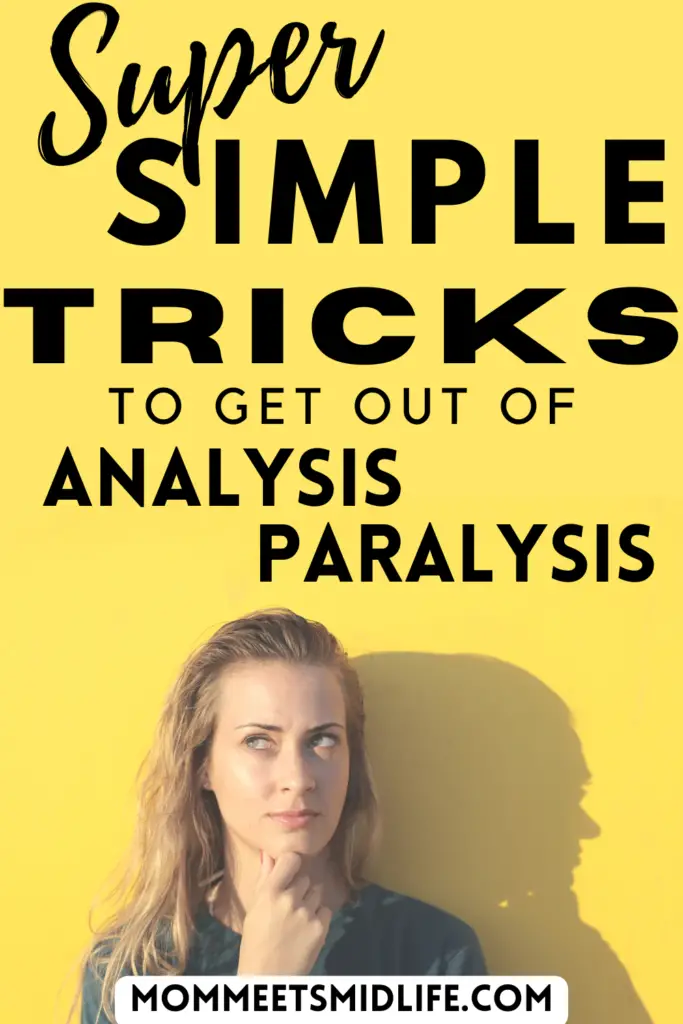Last Updated on December 8, 2023 by Erin
Are you wanting to make some midlife changes but find yourself stuck in analysis paralysis? This post will give tips on how to get out of analysis paralysis, including my special simple trick I’ve started incorporating into my decisions, both big and small.

Ah, analysis paralysis – the bane of every midlifer’s existence!
It’s particularly oppressive if you’re also a neurodivergent midlifer. ADHD and anxiety paralysis are very real, my friend!
We’ve all been there, staring at a problem for hours on end, weighing the pros and cons until our brains feel like they’re about to explode. It’s like being stuck in a mental traffic jam, unable to move forward or backward.
The worst part is you get stuck for so long you end up doing nothing to improve your situation. You tell yourself you’ll put it off later and tuck it away in the depths of your brain’s file cabinet.
If you’re new here, welcome to Mom Meets Midlife! My name is Erin and I’m, as you probably guessed, a mom entering midlife.
While experiencing an early midlife crisis I made the life-changing decision to change careers. It took me several years in this god-forsaken analysis paralysis, but I found my way out and I’m so excited for the possibilities ahead.
My hope is that after reading this post, you find some tips and tricks to move yourself through whatever decision you’re stuck pondering so you can come out of the other side with renewed hope.
Your dream life could be one decision away!
What Is Analysis Paralysis?
If you’re wondering what in the world “analysis paralysis” is let me fill you in.
It’s the inability to make a decision because you’re overthinking it so much you end up not doing anything at all.
It can be big decisions or your everyday routine decisions. Sometimes I honestly get stuck trying to figure out what to make for dinner. After a long day at work with middle schoolers I CANNOT MAKE ONE MORE DECISION!
When analysis paralysis is not dealt with, it can lead to a snowballing anxiety. Down the road, it could lead to regret. Ick.
ADHD Analysis Paralysis
This type of analysis paralysis is caused by ADHD (Attention Deficit Hyperactivity Disorder). It’s a common experience for individuals with ADHD who struggle with racing thoughts, difficulty focusing, and impulsivity.
The anxiety can arise from the pressure to perform, fear of failure, or feeling overwhelmed by the demands of a task. This can lead to a sense of paralysis, making it challenging to make decisions, plan a course of action, and actually execute it.
A hallmark issue for individuals with ADHD is executive functioning difficulties. In simple terms, executive functioning is our brain’s ability to use self-direction for future goals. It includes skills such as attention, inhibition, initiation of tasks, time sense, planning, the ability and to self-monitor.
You can see how difficulties with executive functioning can make decision-making incredibly difficult. This is why adults with ADHD rely on tools to keep them organized and on track.
Many of the suggestions I offer in this post will be helpful for both neurotypical and neurodiverse adults.
Recognize the Signs of Analysis Paralysis
Here are some common signs that you might be experiencing analysis paralysis:
Overthinking
It’s like your mind has a mind of its own, and it won’t stop churning until it’s analyzed every possible scenario, even the ones that are unlikely to happen.
This is the stuff that keeps us awake at night.
Procrastination
Procrastination is the art of delaying things until the very last minute. To be honest, I work create under the pressure of procrastination, but there are times when it’s just not recommended.
Procrastination is a common struggle for many people, and it’s not a sign of laziness or lack of motivation. It’s just your brain’s way of trying to avoid stress and discomfort.
Indecision
Ok, you’ve researched and gathered all the info you need, and yet…nothing. You’re stuck.
It’s perfectly fine to take some time to think. Impulsivity and rash decisions are not the best course of action. Just make sure you’re not avoiding the decision, even after you’ve educated yourself.
Anxiety
If big decisions leave you with anxiety and stress, it’s important to talk to someone who can help.
Some level of anxiety is perfectly normal, but don’t let your nerves go into hyperdrive. Life requires decisions and being worked up all the time isn’t good for your well-being.
Perfectionism
Perfectionism can be a double-edged sword, pushing you to strive for greatness but also making it difficult to make progress.
In my office, I printed out a picture that says “Progress Over Perfection” because it’s something I struggle with daily.
It’s okay to strive for excellence while also acknowledging that mistakes are a natural part of the learning process.
Perfect is not at attainable goal, and if that’s what you are expecting, you’re setting yourself up for paralysis.
Overwhelm
When you feel overwhelmed by the number of options or information available it can lead to inaction.
I know when I feel overwhelmed, I tend to shut down. When there are too many things for my brain to process, it needs a total break.
I just have to make sure that ‘”break” doesn’t go on too long.
Second-guessing
When you doubt yourself and your abilities, you second-guess your choices.
Second-guessing can be a frustrating and exhausting cycle. How do you find a way to trust yourself and move forward.
Fear of failure
It’s scary to make a big decision! You have considered what could go wrong and you don’t want it to happen to you.
My pride was a big obstacle for me when it came to making a decision to leave a job where I felt pretty successful.
Analysis Paralysis Examples
Do any of these examples seem familiar to you?
- A working mom who can’t decide what to make for dinner because she’s mentally tired and faced with way too many choices. As a result, she ends up going through a drive-thru or ordering delivery multiple nights a week.
- A blogger spends hours researching for a blog post topic but cannot make a decision of which topic to choose and ultimately avoids writing anything for several weeks. As a result, they lose traffic and money.
- You and your spouse are trying to plan a fun family vacation, but you spend so much time considering all the options, you wait too long, and can no longer find good deals. You end up staying locally all summer and decide you’ll try again next year.
- A shopper who spends a lot of time comparing different products, reading reviews, and researching before making a decision, ultimately feeling overwhelmed and not making a purchase at all.
- You really want to leave your 9-5 and make a midlife career change. You spend an excessive amount of time weighing the pros and cons of different job opportunities, never taking action to apply for any positions and ultimately remain right where you are.
In all of these examples, analysis paralysis can lead to missed opportunities, increased stress, and a sense of being stuck or unable to move forward. It’s important to recognize when you’re experiencing analysis paralysis and take steps to break free from it.
My Recent Experience
In my marriage I tend to be the spontaneous, impulsive decision-maker and my husband endlessly analyzes EVERYTHING before reaching a conclusion. It drives me absolutely bonkers sometimes.
That being said, I found myself stuck for several years in a major life decision that kept me awake at night with my mind racing and stomach in knots.
Don’t get me wrong…I love being in a helping profession but sometimes it feels like when I get home there’s nothing left in the tank to help my own family. I KNOW there are a lot of you out there who can relate. (Where are my teachers, nurses, and therapists at??)
My husband and I have been investing in rental properties over the years but it’s not yet enough to replace my income. It will definitely help down the road but if I were to leave my job, we would definitely have to make some adjustments.
Most likely, I would have to find some part-time work. It’s terrifying and exciting to try something new.
So, the question for me is, and it’s a doozy…
Should I leave my full-time job and become a stay-at-home parent and/or work part time?
The Simple “Trick” that Helped Me
One trick I used to help me determine the best course of action was to create a pro/con list with a point system.
(Listen, I know this isn’t anything groundbreaking or revolutionary and I’m sure there are plenty of people out there doing something similar. But if this is the first you’ve heard of trying something like this and it sounds helpful, I’m happy to pass it along.)
I am incredibly visual person and while hashing things out with my hubby can be helpful, there is something about assigning a point value to each item that helps me weigh the consequences of each outcome.
Here’s an abbreviated version of my PRO list with assigned point values between 1-10 based on their importance to me:
- Less stress- 8
- No more daycare bills- 5
- Slower mornings- 4
- Better able to keep up with laundry and chores- 6
- Cook more often- 5
- Two years home with my youngest- 7
And here’s my CONS list:
- One income/able to save much less- 8
- No longer adding to a retirement account- 6
- Not utilizing my education and knowledge- 4
- Will take longer to get more investment properties- 3
- Need to figure out health insurance- 5
- Days at home with son could become monotonous- 3
That means I have a score of 35 for my PROS and 29 for my CONS. I keep could adding to the list as my worries come up and even change values as I have more time to ponder.
Seeing the number values is helping me add an objective component to a very subjective situation that has a lot of feelings and emotions tied to it.
You Can Use This Trick for Any Decision, Big or Small
This simple trick isn’t only helpful for major life decisions. You could use it for literally anything. Should you buy that expensive dress for the next wedding you attend? Should you take a trip to Disney this year or next? Does your daughter want to switch to a competitive team or stick to the rec league?
Again, I know this isn’t a miracle fix or crystal ball for your situation, but I hope it helps you get out of analysis paralysis. Sometimes looking at things differently is all it takes to move us forward.
Other Tips for Overcoming Analysis Paralysis
Aside from making a beefed up pros and cons list, here are a few other suggestions:
- Break it down into smaller decisions. For example, if you’re trying to decide where to go on vacation, you might start by making a list of potential destinations. From there, you could research each destination and narrow down your options. Then, you could focus on other aspects of the decision, such as the cost, accommodations, and activities available at each location. Approach it in a systematic and manageable way.
- Create a timeline and/or deadline. This will ensure you take a course of action and motivate you to make the decision, rather than putting it off until…never.
- Acknowledge your feelings and examine the cause. Is there an actual event or experience from your past that causes you to second-guess or is it your fear spiraling out of control? You might need a trusted friend or therapist to help you work through this part.
- Take a pause and breathe.
- Prioritize tasks. What are things that need figured out soon? What can you consider next week?
- Set realistic goals for yourself. You can’t immediately shoot for the moon. Instead of thinking you’re going to become a real estate mogul by the end of the year, how many properties can you realistically invest in over the course of 5 years? Can you start smaller by investing in REITS?
- Trust yourself and your instincts.
- Consider what could wrong AND what could go right.
- Make a Plan B and C. If you’ve already had the foresight to work through any potential problems, you’ll make a decision much more confidently. For example, let’s say I attempt to create a private practice and it majorly fails. My backup plan is to be a substitute teacher until I determine my next move. Ultimately, I can always re-enter the field of education.
- Create a vision board. I created my vision board in the fall, and it helped create clarity as to my personal and professional goals. When have a visual representation of what you want, it keeps you motivated to make decisions to better your life. You can easily make one for free in Canva and print it out or make it your computer wallpaper. Access that here, along with free guiding questions to get you thinking.

Final Thoughts
Just know that if you’re stuck, you’re not alone. I consider myself to be pretty spontaneous, but big decisions can be downright terrifying.
You know you want a better life, but you’re also worried about what could go wrong.
I hope some of the tips, along with my simple pros and cons trick, can help steer you in the right direction. Making a plan and breaking it down into smaller steps is a great starting point. Just make sure to create a deadline, take a pause when you get overwhelmed, and seek support when you need it.
Remember- progress over perfection!
Before you go, you might these posts helpful as well:
- Super Easy Guide to Create a Mom Vision Board
- Midlife Career Change: Advice for Success
- How to Deal with a Midlife Crisis
- How to Get Out of a Midlife Funk
- Becoming a Stay at Home Mom in Midlife: Why? and How?
Now it’s your turn. When did you find yourself in analysis paralysis? Let me know if the comments! And if you found this post helpful or want to refer back to it, don’t forget to pin it!
Sincerely,
Erin



